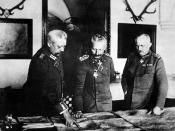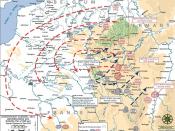Naturally, there are three main points offered, when analyzing the role of Bethmann-Holloweg in the July Crisis. One of them, the sympathetic viewpoint, describes the German Imperial Chancellor as a victim of circumstance, rather weak, but totally guilt-free. The more critical viewpoint assigns him the characteristics of an aggressive expansionist and finally the neutral point balances out the two. It claims that Holloweg lost control, and desired no more than a limited war. Nonetheless, it is never certain how far the Chancellor was a crucial figure.
To begin with, the sympathetic, and possibly very naive view is that the Chancellor did his best to avoid war and was a peace-loving statesman. This view is supported by Holloweg's personal assistant and confidant Kurt Reizler, who suggests that Army Generals, industrialists and the Emperor were trying to exert forces on Holloweg, while he resisted as far as he could. In his diary Reizler claims: ' Holloweg was a helpless victim of circumstance beyond his control, trying at all costs to avoid war, but being dragged to the brink by inflexible military strategies, belligerent generals and a head-strong Emperor' Therefore, it can be interpreted that the Kaiser played a more crucial role in the July Crisis. 'Now or never', exclaimed the Kaiser, directly suggesting his military orientations. The military contribution was also forceful: they asserted that it was best to attack Russia while it was still weak, therefore demanding a war as soon as possible. More so, it is emphasized in the incident with the 'Blank Cheque' that Holloweg tried to avoid war. While the Kaiser promised Austria to support any of their actions unconditionally, without consulting the Chancellor, Holloweg realized that this could lead to a major war and tried to do his best by sending the Kaiser on holiday...


